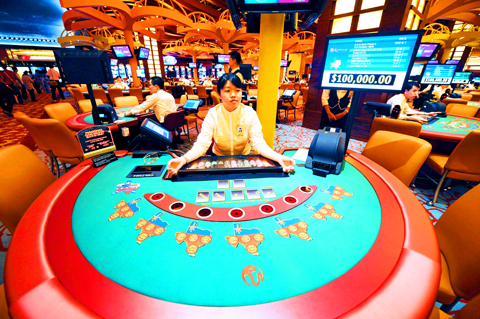Singapore’s first casino opened for business yesterday as the first punter was allowed into the gaming section of Resorts World Sentosa complex.
The opening — to be followed within months by a second casino resort — is part of a multibillion-dollar effort to transform Singapore’s tourism industry.
The doors to the cavernous and carpeted casino were thrown open to the public at 12:18pm on the first day of the Year of the Tiger in the lunar calendar.

PHOTO: AFP
When pronounced in the Cantonese dialect, 12:18 sounds like “prosperity.” A middle-aged Singaporean woman was the first gambler allowed in, followed by an initial crowd of about 200.
The US$4.4 billion resort features Southeast Asia’s first Universal Studios movie theme park, which also opened for a week of sneak previews from yesterday.
“We have waited a long time for this. Today’s opening of the casino is a milestone for Resorts World Sentosa, for Genting Group and for Singapore,” Genting Group chairman Lim Kok Thay (林國泰) said in a ceremony before the doors opened.
“We couldn’t have asked for a better time to open,” he said, referring to Asia leading the world in recovering from the worst global recession since the 1930s.
Singapore’s second casino, Marina Bay Sands, is being completed by the US-based Las Vegas Sands and is expected to open in April.
Officials hope the casinos will help Singapore achieve its target of 17 million visitors a year generating more than US$21 billion by 2015, boosting the services sector and reducing the role of manufacturing in the economy.
A lion dance and firecrackers preceded the opening of the casino.
Resorts World Sentosa last month opened four premium hotels and is testing the rides at the Universal Studios theme park before it is fully opened to the public.
Singapore in 2005 agreed to go ahead with two casino resorts after a rare public debate.
Opponents fear gambling would threaten Singapore’s “family values” reputation and put it at risk of becoming a center for money-laundering.
As a “social safeguard,” Singaporeans will have to pay S$100 a day (US$70) to enter the casinos.

TECH TITAN: Pandemic-era demand for semiconductors turbocharged the nation’s GDP per capita to surpass South Korea’s, but it still remains half that of Singapore Taiwan is set to surpass South Korea this year in terms of wealth for the first time in more than two decades, marking a shift in Asia’s economic ranks made possible by the ascent of Taiwan Semiconductor Manufacturing Co (TSMC, 台積電). According to the latest forecasts released on Thursday by the central bank, Taiwan’s GDP is expected to expand 4.55 percent this year, a further upward revision from the 4.45 percent estimate made by the statistics bureau last month. The growth trajectory puts Taiwan on track to exceed South Korea’s GDP per capita — a key measure of living standards — a

Samsung Electronics Co shares jumped 4.47 percent yesterday after reports it has won approval from Nvidia Corp for the use of advanced high-bandwidth memory (HBM) chips, which marks a breakthrough for the South Korean technology leader. The stock closed at 83,500 won in Seoul, the highest since July 31 last year. Yesterday’s gain comes after local media, including the Korea Economic Daily, reported that Samsung’s 12-layer HBM3E product recently passed Nvidia’s qualification tests. That clears the components for use in the artificial intelligence (AI) accelerators essential to the training of AI models from ChatGPT to DeepSeek (深度求索), and finally allows Samsung

Taiwan has imposed restrictions on the export of chips to South Africa over national security concerns, taking the unusual step of using its dominance of chip markets to pressure a country that is closely allied with China. Taiwan requires preapproval for the bulk of chips sold to the African nation, the International Trade Administration said in a statement. The decision emerged after Pretoria tried to downgrade Taipei’s representative office and force its move to Johannesburg from Pretoria, the Ministry of Foreign Affairs has said. The move reflects Taiwan’s economic clout and a growing frustration with getting sidelined by Beijing in the diplomatic community. Taiwan

READY TO HELP: Should TSMC require assistance, the government would fully cooperate in helping to speed up the establishment of the Chiayi plant, an official said Taiwan Semiconductor Manufacturing Co (TSMC, 台積電) yesterday said its investment plans in Taiwan are “unchanged” amid speculation that the chipmaker might have suspended construction work on its second chip packaging plant in Chiayi County and plans to move equipment arranged for the plant to the US. The Chinese-language Economic Daily News reported earlier yesterday that TSMC had halted the construction of the chip packaging plant, which was scheduled to be completed next year and begin mass production in 2028. TSMC did not directly address whether construction of the plant had halted, but said its investment plans in Taiwan remain “unchanged.” The chipmaker started